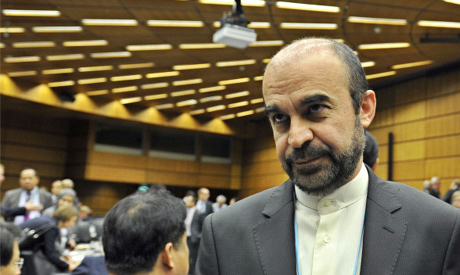
Iran's new Ambassador to the International Atomic Energy Agency, IAEA, Reza Najafi waits for the start of the IAEA board of governors meeting at the International Center in Vienna, Austria, Wednesday, Sept. 11, 2013 (Photo: AP)
Iran's new envoy to the United Nations atomic agency said Thursday that Tehran had a "strong political will" to engage with the international community over its nuclear programme.
But speaking at the International Atomic Energy Agency, Reza Najafi said diplomacy was a two-way street and that Iran would never give up its nuclear "rights", echoing new President Hassan Rowhani.
"I would like to emphasise that there is strong political will on the Iranian side to constructively interact," Najafi told a meeting of the IAEA'S board of governors.
"We hope there would be the same approach and political will on the other side. In this context, we should not lose sight of the fact that interaction is not a one-sided road," he said, according to the text of his remarks.
Hitting out at Israel's "clandestine nuclear weapons programme", Najafi said Iran's nuclear programme "has always been and continues to be exclusively for peaceful purposes" and that Tehran would never relinquish its "right" to peaceful atomic activities.
Speaking to reporters outside the closed-door meeting in Vienna, Najafi said he did not want to "prejudge" the outcome of a meeting with the IAEA on 27 September but that he "hoped" it would be successful.
The IAEA will press Iran to address allegations that until 2003 and possibly since it conducted research on nuclear weapons. Ten previous meetings since early 2012 with Najafi's predecessor Ali Asghar Soltanieh failed.
Rowhani's election in June as Iranian president has raised hopes that these talks, as well as parallel diplomatic efforts with world powers, will make progress after a decade of no success and rising tensions.
Rowhani on Tuesday said that Tehran would not give up "one iota" of its nuclear rights, echoing a mantra frequently used by his more hardline predecessor Mahmoud Ahmadinejad.
The UN Security Council has passed six resolutions since 2006 calling on Iran to suspend the most sensitive parts of its nuclear programme because of suspicions that it is aimed at getting the bomb.
Short link: